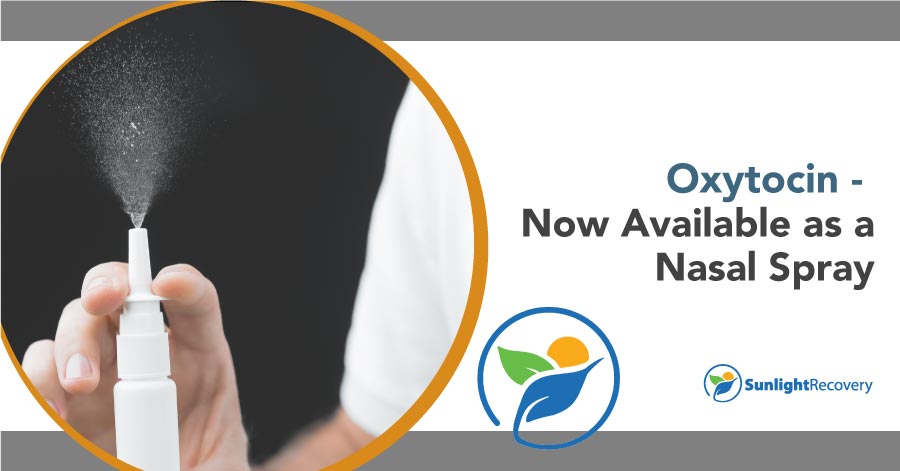Oxytocin is a natural hormone that your body produces during sexual intercourse and childbirth. While this hormone is produced naturally in a healthy body, many people are discovering the benefits of taking this chemical as a dietary supplement, usually in the form of a nasal spray.
Oxytocin nasal spray uses include treatments for autism, PTSD, migraines and much more. The spray can also help alleviate the symptoms of drug and alcohol withdrawal.
Note: It’s very important not to confuse the name oxytocin with OxyContin, the brand name for the strong opioid painkiller, as they’re very, very different chemicals.
What Is Oxytocin?
According to the National Institutes of Health, oxytocin is the most abundant hormone in the human body and is known as the love hormone because it helps create emotional bonds, attachment and social connections. It also plays a critical role in causing contractions of the uterus during childbirth and helping to start lactation after childbirth.
The word oxytocin is derived from the Greek words meaning “swift childbirth” and was first discovered by 1906 who were researching what causes the uterus to contract during labor. In 1952, it became the first hormone to have its amino acid sequence analyzed and the first to be synthesized in a lab.
How Does Oxytocin Work in the Body?
The human body produces oxytocin in the hypothalamus region of the brain and releases it into the blood via the pituitary gland. The hormone then interacts with receptors to cause physical changes in the body. For instance, during childbirth, oxytocin attaches to receptors in the muscles of the uterus, causing those muscles to contract. When the hormone attaches to receptors in the mammary glands, it can trigger milk ejection.
When oxytocin is released in the brain, it can also influence our emotions, regulating emotional responses and behaviors such as bonding, communicating and empathy. Oxytocin is one of the three “happy hormones,” along with serotonin and dopamine. This cocktail of positive chemicals helps give us warm, fuzzy feelings when we’re around people we love and helps us feel stimulated when we’re being touched by a loved one.
Both men and women have oxytocin in their bodies, though women tend to have a larger quantity of the hormone.
How Is Supplemental Oxytocin Administered?
This hormone can only be administered through an injection or a nasal spray. It doesn’t absorb well under the tongue and gets destroyed by the digestive system if ingested via a pill.
High-dosage injections are available only in a hospital setting. Medium-dosage nasal sprays may be purchased with a prescription from online compounding pharmacies. There’s also a growing market of low-dose nasal spray products that are advertised as dietary supplements and don’t have FDA approval.
Oxytocin Nasal Spray Uses
For decades, oxytocin was only available with a prescription during a hospital stay. By far, the most common use of high-dose oxytocin injections (brand name Pitocin) is to artificially induce labor during childbirth. The drug may also be used in mothers having difficulty breastfeeding.
However, since the 1990s, doctors have been prescribing oxytocin nasal spray for a long list of off-label uses. According to the Agency for Healthcare Research and Quality, “off-label prescribing is when a physician gives you a drug that the U.S. Food and Drug Administration (FDA) has approved to treat a condition different than your condition. This practice is legal and common.”
The most common off-label uses for prescription oxytocin nasal spray include:
- Drug and alcohol addiction: Reduces cravings and withdrawal symptoms
- Autism: Oxytocin may help people with autism read social cues
- Social anxiety disorder, borderline personality disorder and schizophrenia: Provides relief of anxious feelings, improves social bonding
- Weight management: Reduces appetite, encourages the body to burn fat
- Sexual dysfunction: Improves libido, arousal and orgasm
- Depression: Improves mood, improves reactions to traditional psych meds
- PTSD: Reduces triggers and intensity of episodes
- Postpartum depression: Improves mood and bonding after childbirth
- Migraines: Reduces symptoms
How Long Does It Take Oxytocin Spray to Work?
Oxytocin administered via nasal spray takes 30-45 minutes to reach peak concentration levels and stays in the body for 4-8 hours, according to the National Institutes of Health.
Can Oxytocin Be Injected?
Since the 1950s, high-dosage oxytocin has been used in hospital settings for conditions related to childbirth and breastfeeding. The primary method for administering these drugs is via injection or IV.
Some doctors may prescribe high-dosage oxytocin for use during home births, but the National Institutes of Health reports this can be very risky. “Intrapartum use of oxytocin should entail controlled dosages administered through infusion, continual monitoring of mother and fetus and surgical back-up, since several adverse outcomes have been reported.”
There are currently no medically justified reasons to administer high-dosage oxytocin outside of childbirth and no evidence that high-dosage oxytocin has value as a recreational street drug.
Can You Become Addicted to Oxytocin?
There are no known addictive qualities to oxytocin. Long-term use does not appear to cause physical or physiological dependencies.
However, any drug or behavior that “makes you feel good” can be habit-forming. People who consume oxytocin may want to continue purchasing and using the product simply because they think it works.
How to Get Oxytocin Spray
In 1960, the pharmaceutical company Novartis invented an oxytocin nasal spray called Syntocinon for the benefit of women struggling to breastfeed. This medication was discontinued in 1997 due to business reasons.
There are currently no American pharmaceutical companies that mass-produce a prescription oxytocin nasal spray. However, several companies have new oxytocin nasal drug products in the pipeline, including GlaxoSmithKline, OptiNose, Tonix and Retrophin.
For now, oxytocin nasal sprays in 50 IU and 100 IU doses are available via online compounding pharmacies. Consult these pharmacies and your doctor to learn how to get oxytocin prescriptions.
Low-dosage (10 IU) oxytocin nasal sprays are commonly available at major retailers with no prescription needed. These are sold as a dietary supplements and, as a result, are not FDA approved. Be sure to check the ingredients to ensure the spray contains oxytocin, as several oxytocin-like sprays are being sold as supplements.
Learn More About Oxytocin From Sunlight Recovery
Oxytocin nasal spray has a variety of benefits and may be a great natural remedy for individuals suffering from the effects of drug and alcohol addiction. If you have questions about how you or a loved one may benefit from oxytocin nasal spray, contact Sunlight Recovery today at (888) 402-3647. Our team of experienced counselors can discuss your treatment plan and whether oxytocin nasal spray is a good fit for your needs.






